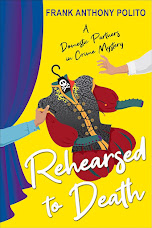By Frank Anthony Polito
Since I’m new to “Writers Who
Kill” – and probably new to you, dear reader – I thought I’d begin with some
backstory. My journey as an author began in the spring of 2004. (“20 years ago!”
he says to himself, totally freaking out.) I was working as a freelance book
publicist at Kensington Publishing in New York City, but I was about to call it
quits and head off to Pittsburgh to study Dramatic Writing (plays and
screenplays) at Carnegie Mellon University.
Little did I know, a casual conversation with Editor-in-Chief, John Scognamiglio, would set me on a path I hadn’t even considered…
John, a fellow gay man and mutual Days of our Lives fan, pulled me aside one

day. “I didn’t know you wrote plays!” I hesitated. “Um…I've written one play.” “Oh! What’s it about?” I gave him the premise: two teenage best friends growing up in the ’80s come out to each other as gay…and mayhem ensues. “Sounds like fun! I’d love to read it.” So, I passed along the script. A few days later, John posed me a question that would change the trajectory of my life: “Have you ever thought about turning your play into a novel?”
My debut, Band Fags! was released in June 2008. The book received some nice reviews from credible LGBTQ publications. It was even named “Best Fiction” by the InsightOut Book Club. The follow-up, Drama Queers!, came out a year later and received the Lambda Literary Award for “Best Gay Romance.” But, despite these early successes, things started to slow down.
Throughout my publishing
journey, I remained unrepresented by a literary agent. After all, why would I
need one? I had a contract offer directly from an editor, and the idea of
giving away 15% of my advance and future royalties seemed unnecessary. Then, in
2011, I did connect with an agent who’d heard good things about my writing, and
we began working together. Sadly, the partnership didn’t unfold as I’d hoped.
For two long years, my agent struggled to secure a publishing deal for my new
work. I wrote proposals, crafted sample chapters, and even completed two entire
novels, which I eventually self-published. And, when the contract came to an
end, we parted ways, and I pretty much gave up novel-writing altogether.

My
debut “quozy” (queer cozy), Renovated to Death was released in May 2022. The series focuses on a queer millennial couple, writer Peter “PJ” Penwell and
his domestic partner, actor JP Broadway (PJ & JP, confusing perhaps, but
cozy-cute!), who renovate old houses on an HGTV-like show called (what else?)
“Domestic Partners,” while helping to solve a few murders. In book 2, Rehearsed to Death, the
partners are on hiatus from their TV show, so they spend their time off
producing a play, written by Peter and starring JP, at the local community
theatre, and the pompous, and very British, director turns up dead on stage,
strangled by his own extra-long cashmere scarf.
 Now
here it is, August 2024, and the third novel in my Domestic Partners in
Crime series, the Halloween-themed Haunted to Death, has just been released.
Still without a literary agent, I’ve been plugging away, doing my best to
connect with readers (hence this post you’re reading!) post on social media,
and create reels showing off my expertise as a home renovator. Based on all the
Bookstagram posts and likes, you’d think I was killing it, but…
Now
here it is, August 2024, and the third novel in my Domestic Partners in
Crime series, the Halloween-themed Haunted to Death, has just been released.
Still without a literary agent, I’ve been plugging away, doing my best to
connect with readers (hence this post you’re reading!) post on social media,
and create reels showing off my expertise as a home renovator. Based on all the
Bookstagram posts and likes, you’d think I was killing it, but…
The unexpected news is
particularly disheartening, since I’ve already completed writing the fourth
book in the series, Dragged
in Death, in which the
partners are drawn into the vibrant world of drag culture, after being asked to
participate in a charity Extravaganza drag show, where the young drag queen
known as Melody Mansion is found dead backstage, smothered by her own bouffant wig.
The looming cancellation of Domestic Partners in Crime is a stark reminder that storytelling
is as much about connecting with readers as it is about crafting engaging
plots. Despite the current uncertainty, I remain hopeful that Haunted to Death will find its audience, and Dragged
to Death will see the light of publication. Ultimately, whether or not the
series continues, I’m proud of the stories I’ve told and the characters I’ve
brought to life, and I’m grateful for every reader who has joined me along the
way.
All this said…If you’ve
already read and enjoyed the adventures of PJ Penwell and JP Broadway in Domestic
Partners in Crime, I hope you’ll tell all your friends to do the same—please!
Every recommendation and book sold helps immensely in making a case for the
continuation of the series. I offer my heartfelt appreciation for any help you
can provide in saving the
series.
Frank Anthony Polito
is a Lambda Literary Award-winning author and playwright. He holds an MFA in
Dramatic Writing from Carnegie Mellon and a BFA in Theatre from Wayne State. His
latest “quozy” mystery Haunted to Death is now on sale. Readers can
visit Frank online at www.frankanthonypolito.com






.jpg)
















